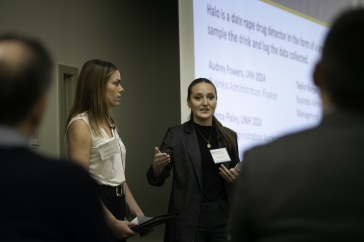?
After a string of sentences in Arabic, Ruwa Majid-Pokorny stops speaking. "OK, tell me what I just said." There are a few quiet responses. She pauses to give a brief pep talk to the dozen or so students in her intermediate Arabic class.
"You've been really not just pushed, but you've been shoved... Take a deep breath and take it easy, you are not being shoved beyond your ability," she says, recognizing that Arabic is one of the more difficult languages out there to learn, much less master. "We're going to dissect it together, but heads up, you are capable, I promise you that."
Her students appreciate the encouragement, and the class continues.
That's how it is for many of the class meetings of this course as well as the elementary Arabic sections — language skills, conversation, Arabic culture, a little tough love and some encouragement.
Majid-Pokorny emigrated from Iraq in 1979, worked in speech therapy in New Hampshire schools, and then as an interpreter with the Language Bank, which offers language and interpretation services.
Majid-Pokorny brings her expertise as a native speaker as well as her skills in speech pathology to her classes — useful in teaching Arabic to American students, she notes, because "there are sounds in Arabic that do not exist in English."
You can hear it in any Arabic class, as native English speakers strain to make what student Kelsey Walsh '15 describes as "guttural sounds" necessary to perfect Arabic pronunciation.
Since its founding nine years ago, the program has grown from a 401 class, to a 503 class, and now to multiple sections of elementary, intermediate and advanced Arabic, taught by Majid-Pokorny and also Islam Karkour, a teaching assistant in the department.
While most college programs offer training in just the formal Modern Standard Arabic (MSA), Majid-Pokorny says UNH's program is unique because it offers MSA and dialect-based Arabic pronunciations and language.
"From Day One I tell my students the two have to go hand in hand. It's challenging for them to learn both, but I tell them to hang in there, and you'll get it.
Students have varying reasons for signing up for the Arabic courses, many of them connecting it to what they want to do after they graduate — pursue careers in international relations, global commerce, political science and journalism. Others have Arabic speakers in their families, and want a chance to master the language.
"When I was looking at schools, the fact that Arabic is offered here was one of the main reasons I picked UNH, so I converse more and more with my father in Arabic," says Janet Khoury '18, whose father is originally from Jordan. "He thinks it's awesome, and it's creating more of a bond between us, too — I can say some stuff that my brothers can't understand."
On a serious note, says Khoury, as an international affairs major, she knew that she wanted to learn a language at a high-level of comprehension and verbal skills.
For Arabic students, the learning is happening not only in a Murkland classroom, but also a few Friday nights a year, when Majid-Pokorny and her husband open their Durham home to students and other interested community members for a traditional meal and friendly conversation.
At a recent gathering, students were allowed to "Ask Your Professor Anything." Most of their questions focused on Majid-Pokorny's background, her early years in the U.S., and dispelling some myths about Arabic culture.
Majid-Pokorny says she likes building a relationship with her students beyond just their classroom work together.
"I've always felt that it's nice having this relationship with them, to say, 'I'm not just your professor, I really do care.' I feel every time I do this, the next time they need me, they can seek me out with more comfort, more ease," she says.
Students benefit from meeting students of all Arabic levels, as well as native-speaking Arabs from the community who stop by, most recently enjoying some Iraqi stew, and later, Arabic coffee and desserts.
Ultimately, says Majid-Pokorny, she wants her students to work hard and be happy with what they can achieve.
"I want them to have worked on their discipline, their work habits .... This course is very rigorous," she says. "I also always hope I've helped to change their perspective on the world, so they can see that the world isn't necessarily divided into East versus West ... that we are, as human beings, more similar than we are different. And language is a very integral part of that ."
?
-
Written By:
Michelle Morrissey ’97 | UNH Magazine | michelle.morrissey@unh.edu




















































